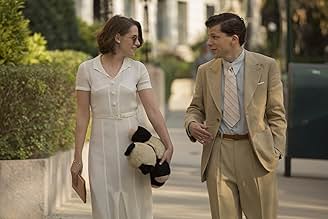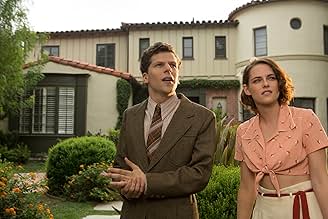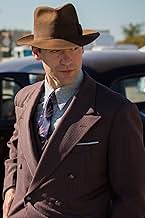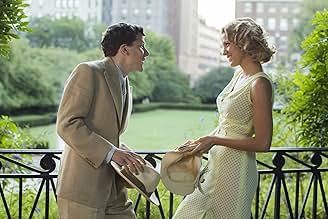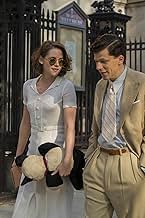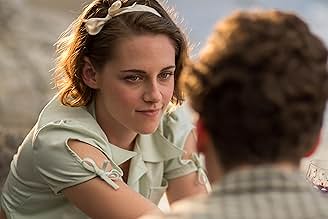IMDb रेटिंग
6.6/10
84 हज़ार
आपकी रेटिंग
1 9 30 के दशक में, एक ब्रोंक्स मूल निवासी हॉलीवुड चला जाता है और एक युवा महिला के साथ प्यार में पड़ जाता है।1 9 30 के दशक में, एक ब्रोंक्स मूल निवासी हॉलीवुड चला जाता है और एक युवा महिला के साथ प्यार में पड़ जाता है।1 9 30 के दशक में, एक ब्रोंक्स मूल निवासी हॉलीवुड चला जाता है और एक युवा महिला के साथ प्यार में पड़ जाता है।
- पुरस्कार
- 8 कुल नामांकन
फ़ीचर्ड समीक्षाएं
The movie "Café Society" is a romantic comedy-drama and it follows a young man who moves to Hollywood in the 1930s and falls in love with his uncle's assistant. Woody Allen has once again delivered an excellent plot with his signature ingredients: Jewish characters, the mob, family dynamics, infidelity, jazz music, and the glamorous underworld of Hollywood studios and New York bars.
The always-Italian Vittorio Storaro's stunning cinematography brings back the nostalgia of the 1930s. The movie's big surprise is two newcomers at the time: Jesse Eisenberg as Bobby and Kristen Stewart as Vonnie, who manage to convey all the chemistry of lovers in doubt.
The movie has its ups and downs, but it manages to keep the viewer engaged until the end. Allen skillfully avoids falling into the trap of predictable and clichéd endings that are common in other Hollywood movies.
The always-Italian Vittorio Storaro's stunning cinematography brings back the nostalgia of the 1930s. The movie's big surprise is two newcomers at the time: Jesse Eisenberg as Bobby and Kristen Stewart as Vonnie, who manage to convey all the chemistry of lovers in doubt.
The movie has its ups and downs, but it manages to keep the viewer engaged until the end. Allen skillfully avoids falling into the trap of predictable and clichéd endings that are common in other Hollywood movies.
Woody Allen's latest, which opened yesterday in Paris and at the Cannes Festival, is a gentle and thoughtful examination of love. Jesse Eisenberg, best known for his portrayal of Mark Zuckerberg in The Social Network, plays Bobby, a young New Yorker who heads out to Hollywood in search of an exciting future. He falls for Vonnie (Kristin Stewart of Twilight fame), the secretary of his Uncle Phil (Steve Carell), a successful producer, and is soon confronted with the fact that she has a mysterious lover. The resulting confusion is worthy of Allen's mentor, Anton Chekhov. In an interview in the French magazine l'Obs, Allen remembers his own experience in Hollywood, talking to a producer who cut him off to take a call from Fred Astaire. We soon meet all of the rest of Bobby's family, including a gangster brother and a sister who is married to an intellectual, who offers such wisdom as the quotation, "Live every day like it's your last and some day you'll be right." With brilliant cinematography by Vittorio Storaro and great performances from Eisenberg, Carell and Stewart, the film is one of Allen's most enjoyable in years. The poster features a stylized profile of a woman with a teardrop - love always includes an element of sadness, even as it brings laughter and self-realization. A French review of the Cannes opening compares Allen to Ernst Lubitsch, master of urbane comedies of manners in the 1930's.
There is a lot going against this movie. Jesse Eisenberg's character comes off as a complete asshole within 10 minutes of the film, thanks to a really terrible scene between him and a Jewish hooker. None of the humor in that scene landed, which just made the situation really sad and uncomfortable to watch, and then kind of difficult to root for Eisenberg at all after that. Steve Carell isn't bad by any means, but he seems incredibly miscast in a role like this (not to say that he can't act in roles that are more serious, but this Hollywood film executive didn't really suit him). Both of the Dorfman parents come off as really awkward on screen and thus kill any of the jokes that they're meant to deliver. The only actor that gives a notable performance in this movie is Corey Stoll as the brother, but it's not enough. Kristin Stewart was mostly fine, but occasionally started picking up some of her infamous Kristin Stewartisms throughout. Carell and Eisenberg become really close out of nowhere, both of the couples' relationships are sped up by Woody Allen's narration (which doesn't really add anything to this film), and this movie is only 90 minutes long, so I feel as if they could have definitely spent more time with all of these relationships, instead of just having Woody tell us what was happening. And on top of all of this, while this is a beautiful film to look at, there is nothing new in this movie. It's another Woody Allen movie with the same romances and love triangles centered around white people who like jazz with a pretty inconclusive and unsatisfying ending.
Director/writer Woody Allen's latest film can be seen as one of his most personal films to date. Dialed to the bright, nostalgic feel of Radio Days (1987), Cafe Society nevertheless reels from an undercurrent of existential authenticity a la Husbands and Wives (1992) poetically and often ruefully addressing the feeling of having lost the road not taken.
Our protagonist is young up-and-comer Bobby Dorfman (Eisenberg), a New Yorker, whose dreams of making it in Hollywood rests uneasily over some very scrawny shoulders. At first he's aided by his Uncle Phil (Carell), an agent and powerhouse among the coastal elite. He sets him up as an assistant and script-reader. Bobby's family dutifully keeps tabs on him back in New York as he climbs the slippery ladder of Hollywood's well-to-do, finding friends in Steve (Schneider) and Rad Taylor (Posey) who have a hand in controlling the talent pipeline from coast to coast. His closest friend and eventual paramour however is Vonnie (Stewart) a comparatively down to earth secretary who would rather bask in the glow of the warm sun then in glitzy opulence. He idolizes her, pines for her despite her insistence that she has a boyfriend; an older man as we later find out.
Woody Allen himself provides the narration for this gentle nostalgia tour through Golden Age Hollywood. Much like his voice, the film feels warm, familiar if sadly slow and blunted. Lacking the consistently snappy tone of earlier works, Cafe Society leans a little too heavily on the love triangle, which granted, captures some excellent drama but is singed from overcooking. When we are rewarded with the usual delights of Allen's repertoire, it all comes out banal, like a list of axioms repeated one too many times.
Yet despite lacking the verbal excitement of Allen's prized filmography, Cafe Society more than delivers in gorgeous cinematography, characterization and themes which are glamorously brought to life by a talented cast. Steve Carell's natural amiability allows us to more easily welter in Phil's more unsavory character decisions which includes having his nephew wait in the waiting room of his office for weeks. He's an agent but he lacks the boorishness of Ari Gold. He believes in what he's selling, and given the way he name- drops by the poolside and the fondness industry insiders seem to have for him, you can tell he's good at what he does. Jesse Eisenberg brings the same frazzled nudnik buoyancy he previously brought to Allen's To Rome with Love (2012). It's easy to see why Eisenberg is a repeated player, the man brings all the trappings of Woody's old characters only with a slightly stronger edge.
If there's one standout however it would have to be Kristen Stewart who resists being the flavorless object of affection. Goodness knows it could have been easy given the time period of the film (not to mention her previous role in the Twilight Series (2008-2012)), but her strident autonomy keeps us invested. She's a piece of Citrine amid fool's gold, a girl next door above the ostentatiousness of industry fugazi. A girl to bring home to mamma.
Much of Bobby's character develops between the intoxicating glamour of Hollywood and the provocative corruptibility of New York City. The dichotomy has a night and day quality that is mirrored by the earthy Vonnie and the glittering Veronica (Lively) who appears later in the film. Large swaths of the movie take place in the Big Apple, much of which concentrates on the foibles of Bobby's sister (Lennick), brother-in-law (Kunken) and mobster brother (Stoll). Far from being unnecessary asides, these stories aptly meld into the film's large themes: love, respect and regret.
With the denseness of a novel and the light touch of Allen's finest, a question the emerges; what is the director trying to tell us through this story? Bobby's balance between the two cities he calls home, mimics Woody Allen's long, illustrious trajectory as a member of the New York intelligentsia and a Hollywood staple. Perhaps he's trying to tell us our problems may seem significant to us and every choice we make means another choice has been deferred, yet in the grand scheme of things, life is ultimately a comedy.
Our protagonist is young up-and-comer Bobby Dorfman (Eisenberg), a New Yorker, whose dreams of making it in Hollywood rests uneasily over some very scrawny shoulders. At first he's aided by his Uncle Phil (Carell), an agent and powerhouse among the coastal elite. He sets him up as an assistant and script-reader. Bobby's family dutifully keeps tabs on him back in New York as he climbs the slippery ladder of Hollywood's well-to-do, finding friends in Steve (Schneider) and Rad Taylor (Posey) who have a hand in controlling the talent pipeline from coast to coast. His closest friend and eventual paramour however is Vonnie (Stewart) a comparatively down to earth secretary who would rather bask in the glow of the warm sun then in glitzy opulence. He idolizes her, pines for her despite her insistence that she has a boyfriend; an older man as we later find out.
Woody Allen himself provides the narration for this gentle nostalgia tour through Golden Age Hollywood. Much like his voice, the film feels warm, familiar if sadly slow and blunted. Lacking the consistently snappy tone of earlier works, Cafe Society leans a little too heavily on the love triangle, which granted, captures some excellent drama but is singed from overcooking. When we are rewarded with the usual delights of Allen's repertoire, it all comes out banal, like a list of axioms repeated one too many times.
Yet despite lacking the verbal excitement of Allen's prized filmography, Cafe Society more than delivers in gorgeous cinematography, characterization and themes which are glamorously brought to life by a talented cast. Steve Carell's natural amiability allows us to more easily welter in Phil's more unsavory character decisions which includes having his nephew wait in the waiting room of his office for weeks. He's an agent but he lacks the boorishness of Ari Gold. He believes in what he's selling, and given the way he name- drops by the poolside and the fondness industry insiders seem to have for him, you can tell he's good at what he does. Jesse Eisenberg brings the same frazzled nudnik buoyancy he previously brought to Allen's To Rome with Love (2012). It's easy to see why Eisenberg is a repeated player, the man brings all the trappings of Woody's old characters only with a slightly stronger edge.
If there's one standout however it would have to be Kristen Stewart who resists being the flavorless object of affection. Goodness knows it could have been easy given the time period of the film (not to mention her previous role in the Twilight Series (2008-2012)), but her strident autonomy keeps us invested. She's a piece of Citrine amid fool's gold, a girl next door above the ostentatiousness of industry fugazi. A girl to bring home to mamma.
Much of Bobby's character develops between the intoxicating glamour of Hollywood and the provocative corruptibility of New York City. The dichotomy has a night and day quality that is mirrored by the earthy Vonnie and the glittering Veronica (Lively) who appears later in the film. Large swaths of the movie take place in the Big Apple, much of which concentrates on the foibles of Bobby's sister (Lennick), brother-in-law (Kunken) and mobster brother (Stoll). Far from being unnecessary asides, these stories aptly meld into the film's large themes: love, respect and regret.
With the denseness of a novel and the light touch of Allen's finest, a question the emerges; what is the director trying to tell us through this story? Bobby's balance between the two cities he calls home, mimics Woody Allen's long, illustrious trajectory as a member of the New York intelligentsia and a Hollywood staple. Perhaps he's trying to tell us our problems may seem significant to us and every choice we make means another choice has been deferred, yet in the grand scheme of things, life is ultimately a comedy.
In my humble opinion most Woody Allen movies have a feel but some you can feel more than others and I do believe this is one of those stronger ones. Im sure it has something to do with the beautiful cinematography, scenery and costumes but also the love story was just so believable and Jessie Eisenberg and Kristen Stewart were just so genuine. Funny I don't normally even like those two actors but put them in a Woody Allen movie and it's a whole new performance. Lastly, I couldnt help but notice that most reviews on here are really good or really bad and that's most likely because you either get his movies or you don't. And I really got this one.
क्या आपको पता है
- ट्रिवियाThis is the first film since Twilight (2008) that Kristen Stewart had to audition for to win the role.
- गूफ़When Bobby comes to Phil's house and Phil tells him he is getting a divorce, there is a brief glimpse of the modern-day LA skyline in the upper right hand corner of the screen behind Phil.
- साउंडट्रैकI Didn't Know What Time It Was
Composed by Richard Rodgers & Lorenz Hart
Performed by Benny Goodman and His Orchestra
Courtesy of RCA Records
By arrangement with Sony Music Licensing
टॉप पसंद
रेटिंग देने के लिए साइन-इन करें और वैयक्तिकृत सुझावों के लिए वॉचलिस्ट करें
- How long is Café Society?Alexa द्वारा संचालित
विवरण
- रिलीज़ की तारीख़
- कंट्री ऑफ़ ओरिजिन
- आधिकारिक साइटें
- भाषाएं
- इस रूप में भी जाना जाता है
- Cafe Society
- फ़िल्माने की जगहें
- उत्पादन कंपनियां
- IMDbPro पर और कंपनी क्रेडिट देखें
बॉक्स ऑफ़िस
- बजट
- $3,00,00,000(अनुमानित)
- US और कनाडा में सकल
- $1,11,03,205
- US और कनाडा में पहले सप्ताह में कुल कमाई
- $3,59,289
- 17 जुल॰ 2016
- दुनिया भर में सकल
- $4,37,63,247
- चलने की अवधि
- 1 घं 36 मि(96 min)
- रंग
- ध्वनि मिश्रण
- पक्ष अनुपात
- 2.00 : 1
इस पेज में योगदान दें
किसी बदलाव का सुझाव दें या अनुपलब्ध कॉन्टेंट जोड़ें







